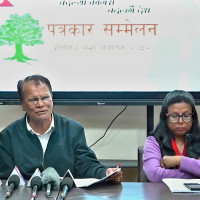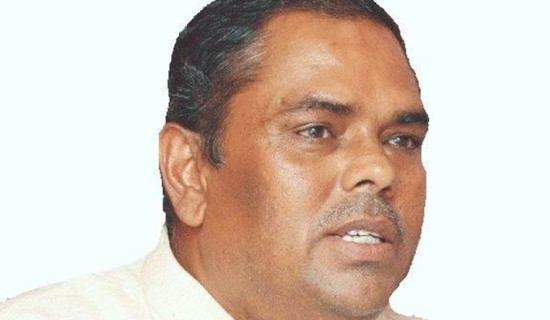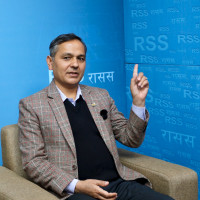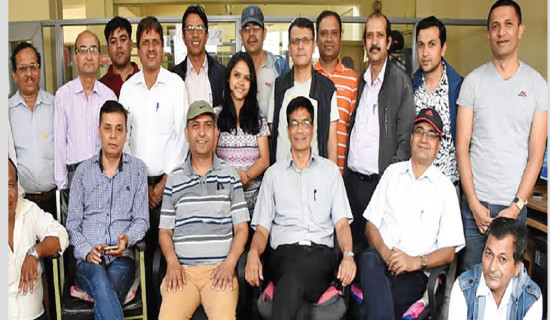- Monday, 23 February 2026
Nepal’s Struggle For Stability
The promulgation of a new constitution in 2015 transformed Nepal into a federal democratic republic, aiming to address long-standing social, political, and economic problems. Federalism was introduced to decentralise governance, empowering local governments and bringing decision-making closer to the people. Despite its achievements, there are gaps in its implementation. The absence of key laws has hindered making the governance system effective and attaining balanced development across provinces. As we are marking the 9th anniversary of the enforcement of the national charter, some parties have called for its amendment. However, the constitution experts, whom this scribe talked to, have emphasised the need for a holistic approach to constitutional amendments, ensuring that the process is inclusive and transparent. Amendments should be carefully planned to avoid potential political conflict. Nepal’s journey towards fulfilling the constitutional vision of equality, justice, and sustainable peace is ongoing, and a thorough review of the past nine years is necessary to guide future reforms. Here are excerpts from conversations with the experts:
Prof. Bipin Adhikari, constitution expert
The constitution has brought profound changes to the lives of people. It has promoted decentralised governance through the creation of three layers of government—local, provincial, and federal. This has empowered local governments, giving citizens more direct access to the decision-making process and resources. The statute also guarantees fundamental rights, including education, health, and equality, which has improved social justice and inclusion for marginalised communities. Still, challenges remain, such as uneven development across provinces and recurring political disputes. Resource management and coordination between three tiers of government, especially in law formulation and resource allocation, are still problematic. The constitution outlines the structure, but all tasks are to be governed by the laws. The laws related to the federal civil services, provincial police, and distribution of natural resources among the three-tier government are yet to be formulated. As a result, local units and provinces have not fully exercised their rights.
The state entities have struggled to develop essential infrastructure within the federal framework. This has hindered in enhancing the competency of the provinces. If we think about amending the constitution, it requires meticulous preparation and broad-based public endorsement. A thorough review of the constitution is essential before making any revision. Opening a public discourse on potential modification ensures inclusiveness and transparency. For example, if two major parties, the Nepali Congress and CPN-UML, attempt to move an amendment bill without scrupulous planning, it can invite unintended troubles. It is essential to form an expert panel to meticulously review and analyse the required changes, drawing on insights from the past nine years of its implementation. The amendment should strengthen the federal republic and ensure long-term stability.
Govinda Bandi, former minister of law, justice and parliamentary affairs
The constitution has institutionalised the achievements of past movements, revolts, and armed conflict. It reflects the struggles and aspirations of the people for a better society. It is not just a law created by a few representatives. Therefore, it is the responsibility of every political party, individual, and institution to safeguard the national charter. The citizen should feel the impact of the constitution in their life, as it ensures the protection of fundamental rights, social justice, an independent judiciary, a free press, and amicable relations with other countries.
One must not forget that the Comprehensive Peace Agreement of 2006 has played an important role in drafting the constitution. Many of the concepts in the constitution are guided by the peace agreement.
Also, most of the Articles of the peace accord are integrated into the constitution’s various Sections and Clauses. For instance, when interpreting the US Constitution, legal experts refer to the Declaration of Independence, which predates the Constitution.
That declaration is considered the voice of the people, and even courts consult it when interpreting the Constitution. Similarly, the peace agreement plays a parallel role to the Independence Declaration.
We have set up the Truth and Reconciliation Commission (TRC) to investigate the causes of the conflict and human rights violations that occurred during the insurgency.
The TRC should provide recommendations for state structure, security agencies, and judicial systems.
However, the TRC, which has been limited to accepting complaints and recording statements, seeks to punish perpetrators and deliver justice to the victims. So far, we have failed to establish an institution to prepare a roadmap for the constitution and state structure. We have overly politicised the justice process, making it a means to go to power or a political weapon. As a result, we have not advanced the rational justice process. Statute amendments must be carried out with extensive groundwork.
The constitution should not be amended merely based on a politician's will or just because a political party has reached an agreement. The TRC’s recommendations must be taken into account for future amendments.
Raju Prasad Chapagai, constitutional and human rights lawyer
The constitution has been widely regarded as a progressive and modern document that has rekindled a ray of hope for peace and the rule of law. It has embodied the people’s aspirations for transformative change across every sector.
However, its implementation failed to live up to expectations. Despite its promise, meaningful progress has been slow, and the envisioned reforms remain unrealised. Many of the systematic changes and improvements anticipated by the people have yet to materialise, leaving a gap between the constitution’s vision and the reality on the ground.
Constant political infighting and frequent dissolution of the governments, driven by self-interest, have undermined the integrity of important institutions like the courts and bureaucracy. A robust constitution alone does not guarantee effective governance.
But, it requires capable, dedicated, and sincere leadership. While the constitution, drafted by the Constituent Assembly, marks a step ahead of past statutes, its implementation has been sluggish. Provincial and local governments have faced challenges in exercising their constitutional rights. For instance, although provinces are constitutionally empowered with exclusive policy authority, they still depend on the central government.
Another pressing concern is that in the parliamentary history of Nepal, no government has been able to complete a full five-year term in office. Due to the unstable government, neither development is possible nor can the aspirations of citizens be fulfilled. One of the primary goals of the new constitution is to ensure a stable government.
But, the leaders of the political parties have exploited the loopholes in the constitution, triggering instability time and again.
(Rijal is a journalist at The Rising Nepal.)







-square-thumb.jpg)








